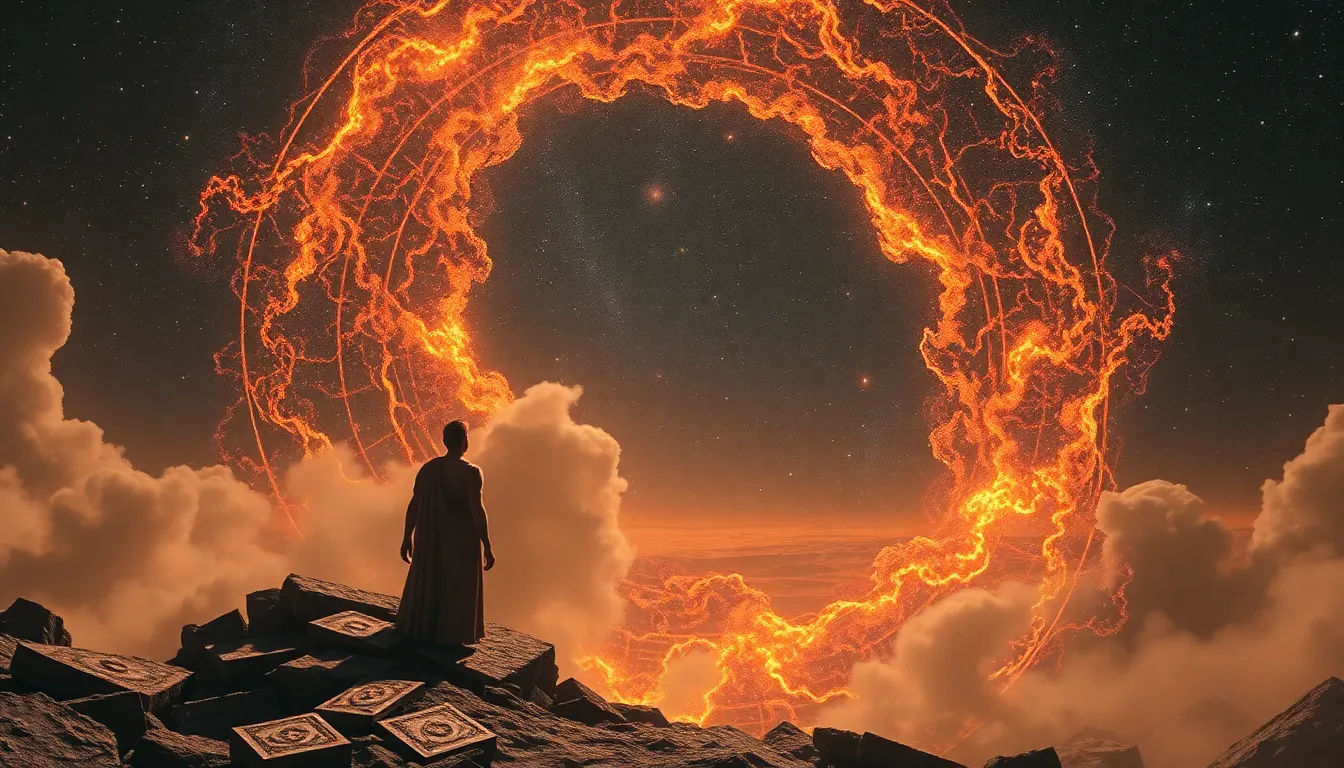Exploring the Chaos: The Initial State of the Universe in Theogony
I. Introduction
Hesiod’s Theogony is a foundational text in Greek mythology, presenting a systematic account of the origins of the gods and the universe. Composed in the 8th century BCE, it serves as one of the earliest sources detailing the genealogy of the divine, the birth of the cosmos, and the establishment of order from primordial chaos.
In Greek mythology, Chaos holds a significant place as the initial state of existence from which all things emerged. This concept is not merely a void but represents a rich potentiality that precedes the formation of the universe. The purpose of this article is to analyze the notion of Chaos as the primordial state in Theogony, exploring its implications and significance in the broader context of Greek mythology.
II. Understanding Chaos: A Definition
The term “Chaos” is derived from the Greek word khaos, which translates to “gap,” “chasm,” or “void.” It suggests a state of unformed potential, a primordial emptiness that existed before the cosmos came into being.
It is essential to distinguish between Chaos and the later cosmogonic entities that emerge within the narrative. Unlike Gaia (Earth), Tartarus (the abyss), or Eros (Love), Chaos is a formless entity that signifies both disorder and the potential for creation.
Furthermore, Chaos acts as a metaphor for the chaos in human experience—an embodiment of disorder that can lead to the birth of new forms of existence. This duality emphasizes the transformative power of Chaos, reinforcing its importance within the mythological framework.
III. The Role of Chaos in Theogony
In Theogony, Chaos is the first entity mentioned, setting the stage for creation. Hesiod describes Chaos as a primordial void that existed before anything else. It is from this state that the first beings emerge, indicating that Chaos is not merely a backdrop but an active participant in the cosmogony.
Chaos is intimately connected to other primordial beings. After the initial mention of Chaos, the text introduces:
- Gaia (the Earth)
- Tartarus (the abyss)
- Eros (Love)
- Uranus (the Sky)
The relationships between these entities underscore a complex interplay where Chaos serves as a fertile ground for the emergence of order. The implications of Chaos on the creation of the cosmos are profound, as it highlights the transition from disorder to organized existence.
IV. The Emergence of Order from Chaos
The process of cosmogony in Theogony illustrates the transition from Chaos to Cosmos—an evolution from disorder to structured reality. This transformation is pivotal in understanding the nature of existence in Greek mythology.
Key figures born from Chaos include:
- Gaia: The personification of the Earth, who becomes the mother of all life.
- Tartarus: The deep abyss that is used as a dungeon of torment and suffering.
- Eros: The embodiment of love and attraction, who facilitates the union of opposites.
The emergence of these entities represents the establishment of order from primordial chaos. Gaia, in particular, plays a crucial role in the continuation of life and the establishment of the universe as we know it.
V. Comparative Analysis: Chaos in Other Mythologies
Chaos as a precursor to order is not unique to Greek mythology. Many other cultures have creation myths that feature a similar theme. For instance:
- Babylonian Mythology: The Enuma Elish describes a primordial chaos called Tiamat, from which the gods emerge after a great cosmic battle.
- Egyptian Mythology: The concept of Nun represents the primordial waters of chaos before the creation of the world, from which the sun god Ra emerges.
These myths share similarities with Hesiod’s account, highlighting the universal theme of chaos as a necessary precursor to order. The comparative analysis of these myths enriches our interpretation of Theogony, illustrating how different cultures grapple with the concepts of creation and existence.
VI. Philosophical Interpretations of Chaos
The idea of Chaos has permeated philosophical thought, particularly in pre-Socratic philosophy. Thinkers such as Anaximander and Heraclitus explored the nature of existence, often referencing chaos as a fundamental aspect of reality.
In modern philosophy, Chaos has found relevance in metaphysics and existentialism, where it is seen as a symbol of uncertainty and the unknown. Contemporary discussions on creation and existence often reflect on the balance between chaos and order, questioning how life emerges from disorder.
Philosophical interpretations of Chaos provide a deeper understanding of its role in human existence and the universe, reinforcing its significance as a foundational concept.
VII. The Legacy of Chaos in Literature and Art
The influence of Theogony extends beyond ancient texts, inspiring countless literary works throughout history. Authors and poets have drawn upon the themes of Chaos to explore the complexities of existence and creation.
In visual arts, Chaos is often represented through abstract forms or tumultuous scenes, reflecting the struggle between disorder and order. Popular culture has also embraced the theme, with depictions of chaos appearing in films, music, and literature.
This enduring fascination with Chaos demonstrates its significance as a theme in human creativity, allowing artists and writers to explore the depths of existence and the nature of reality.
VIII. Conclusion
In summary, Chaos serves as a foundational element in Hesiod’s Theogony, representing the initial state of the universe and the potential for creation. Its role in the narrative illustrates the transition from disorder to order, emphasizing the complexities of existence in Greek mythology.
The ongoing significance of Chaos in understanding the universe reflects our collective fascination with the balance between chaos and order. This theme resonates across cultures and disciplines, demonstrating that the exploration of Chaos is integral to our understanding of life, creation, and existence.
Ultimately, Chaos invites us to reflect on the nature of our reality, reminding us that from the depths of disorder, new forms of order and existence can emerge.




